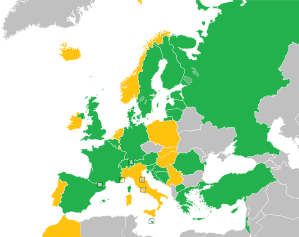Eurovision Song Contest 2002
The Eurovision Song Contest 2002 was the 47th edition of the annual Eurovision Song Contest. It took place in Tallinn, Estonia, following Tanel Padar, Dave Benton & 2XL's win at the 2001 contest in Copenhagen, Denmark with the song "Everybody". It was the first time Estonia had hosted the contest - 8 years after the country made its debut. Organised by the European Broadcasting Union (EBU) and host broadcaster Eesti Televisioon (ETV), the contest was held at the Saku Suurhall, with the final on 25 May 2002. The live show was hosted by Annely Peebo and Marko Matvere.[2]
| Eurovision Song Contest 2002 | |
|---|---|
| A Modern Fairytale | |
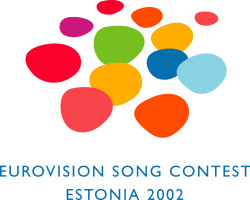 | |
| Dates | |
| Final | 25 May 2002 |
| Host | |
| Venue | Saku Suurhall Tallinn, Estonia |
| Presenter(s) | |
| Directed by | Marius Bratten |
| Executive supervisor | Christine Marchal-Ortiz |
| Executive producer | Juhan Paadam |
| Host broadcaster | Eesti Televisioon (ETV) |
| Opening act | "Everybody" performed by Tanel Padar & Dave Benton |
| Interval act |
|
| Website | eurovision |
| Participants | |
| Number of entries | 24 |
| Debuting countries | None |
| Returning countries | |
| Non-returning countries | |
Participation map
| |
| Vote | |
| Voting system | Each country awards 1-8, 10, and 12 points to their 10 favourite countries |
| Nul points | None |
| Winning song | |
It was the first Eurovision Song Contest held in a Baltic state country, in a former Soviet republic and in a Finno-Ugric language-speaking country.
Twenty-four countries participated in the contest. Austria, Belgium, Cyprus, Finland, Macedonia, Romania and Switzerland returned after their relegation from the previous edition. Iceland, Ireland, Netherlands, Norway and Poland were relegated due to their poor results in 2001. It was the first (and only time) that Ireland and Norway were relegated from the contest. Latvia was also set to sit out this year, but when Portugal annonced their non-participation, due to internal problems at its broadcaster, it left a spot open for Latvia to take, as the country had finished higher the year before than any of the other relegated countries.
The winner was Latvia with the song "I Wanna", performed by Marie N who wrote it with Marats Samauskis. This was Latvia's first victory in the contest, after only 3 years of participation. Malta, United Kingdom, Estonia and France rounded out the top five. Malta achieved their best result in their Eurovision history. Further down the table, Denmark finished twenty-fourth (last place), despite being one of the favourites.
Location
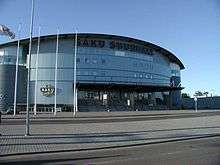
Tallinn is the capital and largest city of Estonia. It is situated on the northern coast of the country, on the shore of the Gulf of Finland, 80 km (50 mi) south of Helsinki in Finland, east of Stockholm in Sweden, and west of Saint Petersburg in Russia. Founded in 1248 but the earliest human settlements date back to 3000 years BC, making it one of the oldest capital cities of Northern Europe. Due to its important strategic location the city soon became a major trade hub, especially between the 14th to 16th century when it grew to be a key centre of commerce within the Hanseatic League. Tallinn's Old Town is one of the best preserved and intact medieval cities in Europe and is listed as a UNESCO World Heritage Site.[3]
Venue
Early in the proceedings, media outlets had begun speculating whether Estonian broadcaster ETV would be able to host the contest, citing a lack of a suitable venue and budgetary concerns; however, worries were put to rest when a combination of fundraising activities and the Estonian Government enabled them to host the event.[2]
The Saku Suurhall was chosen as the venue for the contest. It is the largest indoor arena in Estonia, built in 2001 and holds up to 10,000 people. It is named after the Estonian brewery and soft drink company Saku.
Format
Slogan
For the first time, a slogan (or theme) was implemented. This year's theme was called 'A Modern Fairytale', which was evident in the postcards shown between the songs, which showed classic fairytales ending in modern Estonian situations.[4]
Postcards
The postcards continued with the opening theme of "A Modern Fairytale" taking well known fairy tales and translating them into Estonian life through short films, with a moral at the end of each one of them. The various fairy tales were as following, listed in appearance order:[5]
.svg.png)







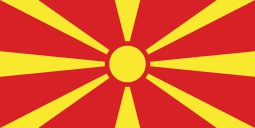






.svg.png)







.svg.png)
Voting
Half of the participating countries organized a televote where the top 10 songs received the points, 1, 2, 3, 4, 5, 6, 7, 8, 10 and 12, but Macedonia, Romania, Russia, Turkey and Bosnia and Herzegovina used juries, while Cyprus, Greece, Spain, Croatia, Finland, Malta, Slovenia and Lithuania used a 50-50 mix of both televoting and jury votes.
In the EBU's rules for the 2002 contest, it was stated; In the televoting, households shall not be permitted to vote more than three times.[6] This was used as it had become apparent that the public vote favoured songs in the later part of the running order in comparison to the songs nearer to the start - particularly in the preceding 2001 contest. At this contest (and the following one) the broadcaster decided to reverse the song recaps - starting instead with the last performed song (24) and finishing with the first performed song (1).
Incidents
Commentator remarks
Controversy erupted during the competition over remarks by commentators on Swedish and Belgian TV, both of whom told the audience not to vote for the Israeli entry "Light a candle" by Sarit Hadad. The song received zero points from the Swedish audience but earned two from the Belgians, finishing 12th overall.[7]
Allegation of vote swapping
This year saw allegations that the juries in certain countries were guilty of swapping votes among other. According to the Norwegian newspaper Dagbladet, The French Head of Delegation allegedly said that members of the Cypriot delegation had approched him to swap votes. In addition to Cyprus, allegations were also made toward Greece, Russia, Macedonia, Malta and Romania.[8]
Participating countries
A total of 24 countries competed in the 2002 contest, which included the top 17 countries from the previous year's contest, alongside the seven returning countries which had been relegated from competing in the 2001 contest. These countries replaced the bottom 6 countries from the 2001 contest, which were relegated from taking part in this year's contest.
The total participants had originally been 22, but when the European Broadcasting Union (EBU) increased their participation number for the contest to 24 this granted Israel and Portugal the opportunity to enter. Portugal declined to enter the contest due to internal problems in the Portuguese broadcaster RTP. This allowed Latvia (who went on to win the contest) to enter.[2][9]
Draw for the running order took place on 9 November 2001.[6]
Returning artists
| Artist | Country | Previous year(s) |
|---|---|---|
| Constantinos Christoforou (part of One) | 1996 | |
| Monica Anghel | 1996 (Pre-qualifying round) |
Results
Countries in bold were allowed to compete in the Eurovision Song Contest 2003.
Score sheet
| Voting procedure used: 100% Televoting 50% Jury & televote 100% Jury vote |
Voters | |||||||||||||||||||||||||
|---|---|---|---|---|---|---|---|---|---|---|---|---|---|---|---|---|---|---|---|---|---|---|---|---|---|---|
| Cyprus | 85 | 3 | 12 | 6 | 10 | 6 | 4 | 1 | 4 | 3 | 12 | 8 | 4 | 8 | 4 | |||||||||||
| United Kingdom | 111 | 12 | 7 | 6 | 4 | 5 | 6 | 2 | 8 | 6 | 7 | 6 | 1 | 8 | 2 | 10 | 8 | 5 | 8 | |||||||
| Austria | 26 | 1 | 1 | 7 | 5 | 12 | ||||||||||||||||||||
| Greece | 27 | 12 | 1 | 8 | 6 | |||||||||||||||||||||
| Spain | 81 | 7 | 2 | 4 | 6 | 6 | 12 | 7 | 6 | 12 | 12 | 7 | ||||||||||||||
| Croatia | 44 | 6 | 6 | 5 | 5 | 5 | 2 | 3 | 12 | |||||||||||||||||
| Russia | 55 | 5 | 2 | 10 | 1 | 3 | 8 | 10 | 10 | 6 | ||||||||||||||||
| Estonia | 111 | 7 | 3 | 5 | 3 | 6 | 2 | 12 | 10 | 8 | 10 | 4 | 4 | 8 | 2 | 2 | 6 | 12 | 7 | |||||||
| Macedonia | 25 | 3 | 4 | 1 | 5 | 12 | ||||||||||||||||||||
| Israel | 37 | 5 | 1 | 5 | 1 | 2 | 10 | 5 | 5 | 3 | ||||||||||||||||
| Switzerland | 15 | 5 | 3 | 2 | 3 | 1 | 1 | |||||||||||||||||||
| Sweden | 72 | 1 | 4 | 1 | 8 | 3 | 7 | 10 | 12 | 1 | 4 | 7 | 4 | 10 | ||||||||||||
| Finland | 24 | 2 | 5 | 1 | 10 | 3 | 3 | |||||||||||||||||||
| Denmark | 7 | 4 | 1 | 1 | 1 | |||||||||||||||||||||
| Bosnia and Herzegovina | 33 | 7 | 3 | 7 | 3 | 6 | 2 | 3 | 2 | |||||||||||||||||
| Belgium | 33 | 4 | 1 | 7 | 3 | 4 | 2 | 10 | 2 | |||||||||||||||||
| France | 104 | 10 | 3 | 8 | 3 | 7 | 10 | 8 | 12 | 5 | 8 | 10 | 6 | 4 | 3 | 2 | 5 | |||||||||
| Germany | 17 | 1 | 2 | 2 | 1 | 3 | 3 | 4 | 1 | |||||||||||||||||
| Turkey | 29 | 4 | 3 | 8 | 7 | 7 | ||||||||||||||||||||
| Malta | 164 | 10 | 12 | 8 | 6 | 10 | 12 | 5 | 7 | 10 | 10 | 4 | 4 | 2 | 12 | 4 | 7 | 6 | 10 | 5 | 10 | 7 | 3 | |||
| Romania | 71 | 8 | 8 | 5 | 12 | 12 | 8 | 4 | 1 | 7 | 6 | |||||||||||||||
| Slovenia | 33 | 6 | 2 | 7 | 8 | 2 | 2 | 1 | 5 | |||||||||||||||||
| Latvia | 176 | 4 | 8 | 10 | 10 | 12 | 2 | 10 | 12 | 7 | 12 | 8 | 5 | 6 | 7 | 5 | 8 | 8 | 12 | 6 | 7 | 5 | 12 | |||
| Lithuania | 12 | 4 | 2 | 6 | ||||||||||||||||||||||
12 points
Below is a summary of all 12 points in the final:
| N. | Contestant | Voting nation |
|---|---|---|
| 5 | Latvia | |
| 3 | Malta | |
| Spain | ||
| 2 | Cyprus | |
| Estonia | ||
| Romania | ||
| 1 | Austria | |
| Croatia | ||
| France | ||
| Macedonia | ||
| Greece | ||
| Sweden | ||
| United Kingdom |
Marcel Bezençon Awards
For the first time, the Marcel Bezençon Awards were handed out to the best competing songs in the final. Founded by Christer Björkman (Sweden's representative in the 1992 Eurovision Song Contest and current Head of Delegation for Sweden) and Richard Herrey (member of the Herreys, Eurovision Song Contest 1984 winner from Sweden), the awards are named after the creator of the annual competition, Marcel Bezençon.[11] The awards are divided into 3 categories; Press Award; Artistic Award; and Fan Award.[12]
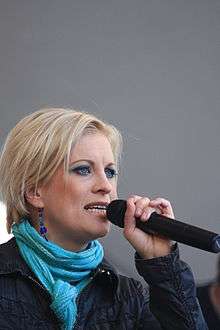
| Category | Country | Song | Performer(s) | Final result | Points |
|---|---|---|---|---|---|
| Artists Award | "Never Let It Go" | Afro-dite | 8th | 72 | |
| Fan Award (voted by members of OGAE) |
"Addicted to You" | Laura Voutilainen | 20th | 24 | |
| Press Award | "Il faut du temps" | Sandrine François | 5th | 104 |
International broadcasting
As had been the case every year since the mid-1980s, the contest was broadcast in Australia on SBS-TV with the BBC commentary. Within a few years, the contest would grow to be so popular in Australia, it would warrant SBS sending its own commentators - and eventually to become an active participant.
Other involved countries
%3B_Flag_of_Serbia_and_Montenegro_(2003%E2%80%932006).svg.png)
- After the breakup of Yugoslavia, Federal Republic of Yugoslavia last participated in 1992. Radio Television of Serbia broadcast the show. Originally, first time as Serbia and Montenegro had planned debuts, but the EBU's late changes to the relegation procedure meant that they could not compete. They made their debut in 2004.
Comentators and spokespersons
Spokespersons
.svg.png)














.svg.png)







.svg.png)
Commentators
Television
Participating countries
.svg.png)














.svg.png)







.svg.png)
Non-participating countries
.svg.png)







%3B_Flag_of_Serbia_and_Montenegro_(2003%E2%80%932006).svg.png)
Radio
Participating countries
Some participating countries did not provide radio broadcasts for the event; the ones who did are listed below.
.svg.png)










.svg.png)



Non-participating countries


Official album
| Eurovision Song Contest: Tallinn 2002 | ||||
|---|---|---|---|---|
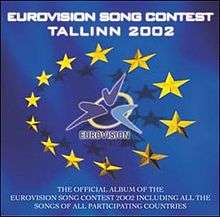 | ||||
| Compilation album by | ||||
| Released | 18 May 2002 | |||
| Genre | Pop | |||
| Length | 73:07 | |||
| Label | Ariola | |||
| Eurovision Song Contest chronology | ||||
| ||||
| Alternative cover | ||||
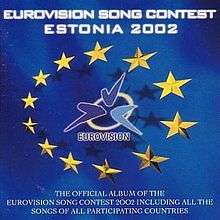 An alternative cover showing the title as Eurovision Song Contest: Estonia 2002. | ||||
Eurovision Song Contest: Tallinn 2002 (also known as Eurovision Song Contest: Estonia 2002) was the official compilation album of the 2002 Contest, put together by the European Broadcasting Union and released by Ariola Records on 18 May 2002. The album featured all 24 songs that entered in the 2002 contest.[41]
Charts
| Chart (2002) | Peak position |
|---|---|
| German Compilation Albums (Offizielle Top 100)[42] | 6 |
References
- "Eurovision Song Contest 2002 Interval Act". YouTube. Retrieved 2012-08-09.
- Bakker, Sietse (2009-12-23). "The end of a decade: Tallinn 2002". European Broadcasting Union. Retrieved 23 December 2009.
- "Historic Centre (Old Town) of Tallinn". UNESCO World Heritage Centre. 7 December 1997. Retrieved 29 September 2013.
- Bakker, Sietse (2002-05-23). "Postcards about fairytales compared with Estonia". ESCToday. Retrieved 2002-05-23.
- "Eurovision 2002 : The Postcards". San Marino Deacon. Retrieved 8 July 2015.
- "Rules of Eurovision Song Contest 2002" (PDF). Myledbury. Retrieved 9 November 2014.
- Ringby, Daniel. "Israeli government investigates ESC". ESCToday. Archived from the original on 2016-10-18. Retrieved 2009-07-30.
- http://esctoday.com/1498/cheating_at_the_eurovision_song_contest_2002/
- Bakker, Sietse (2002-11-29). "EBU confirmed: Portugal resigns, Latvia is in". ESCToday. Retrieved 2009-02-28.
- "Eurovision Song Contest 2002". The Diggiloo Thrush. Retrieved 5 March 2012.
- "Marcel Bezençon Award - an introduction". Poplight. Archived from the original on 2013-10-17. Retrieved 2009-06-02.
- "Winners of the Marcel Bezençon Awards 2012 | News | Eurovision Song Contest - Baku 2012". Eurovision.tv. Retrieved 2012-08-09.
- Savvidis, Christos (OGAE Cyprus)
- "Εκφωνητές της ΕΡΤ για τις ψήφους της Ελλάδας στην EUROVISION - Page 3". Retromaniax.gr. Archived from the original on 2012-09-11. Retrieved 2012-08-09.
- "• Pogledaj temu - SPOKESPERSONS". Forum.hrt.hr. 2008-02-29. Archived from the original on 2012-03-14. Retrieved 2012-08-09.
- "ESCforum.net". ESCforum.net. Retrieved 2012-08-09.
- "Infosajten.com". Infosajten.com. Archived from the original on July 18, 2012. Retrieved 2012-08-09.
- "Selostajat ja taustalaulajat läpi vuosien? • Viisukuppila". Viisukuppila.fi. Retrieved 2012-08-09.
- "Forside". esconnet.dk. Archived from the original on 2012-03-24. Retrieved 2012-08-09.
- "Concours Eurovision de la Chanson • Consulter le sujet - Porte-paroles des jurys des pays francophones". Eurovision.vosforums.com. Retrieved 2012-08-09.
- Archived January 24, 2016, at the Wayback Machine
- "Η Δάφνη Μπόκοτα και η EUROVISION (1987-2004)". Retromaniax.gr. Archived from the original on 2012-09-12. Retrieved 2012-08-09.
- "FORO FESTIVAL DE EUROVISIÓN • Ver Tema - Uribarri comentarista Eurovision 2010". Eurosongcontest.phpbb3.es. Archived from the original on 2012-03-17. Retrieved 2012-08-09.
- Archived September 2, 2011, at the Wayback Machine
- "Selostajat ja taustalaulajat läpi vuosien? • Viisukuppila". Viisukuppila.fi. Retrieved 2012-08-09.
- "Bart Peeters co-commentator op songfestival : showbizz". Mijnnieuws.skynetblogs.be. Archived from the original on 2012-04-02. Retrieved 2012-08-09.
- Christian Masson. "2002 - Tallinn". Songcontest.free.fr. Retrieved 2012-08-09.
- "Dr. Peter Urban kommentiert - Düsseldorf 2011". Duesseldorf2011.de. Archived from the original on 2012-03-24. Retrieved 2012-08-09.
- "Dagblaðið Vísir - DV, 25.05.2002". Timarit.is. Retrieved 2012-08-09.
- "RTÉ so lonely after loss of Gerry - Marty". 20 May 2010. Retrieved 29 May 2010.
He has been providing commentary for Irish viewers since 2000 and maintains great enthusiasm for the much lampooned contest.
- www.eurovisionartists.nl. "Welkom op de site van Eurovision Artists". Eurovisionartists.nl. Retrieved 2012-08-09.
- "Alt du trenger å vite om MGP - Melodi Grand Prix - Melodi Grand Prix - NRK". Nrk.no. 2003-05-27. Retrieved 2012-08-09.
- "Zobacz temat - Eurowizyjna gra". Eurowizja.Com.Pl. Archived from the original on 2012-03-23. Retrieved 2012-08-09.
- "Comentadores Do ESC - escportugalforum.pt.vu | o forum eurovisivo português". 21595.activeboard.com. Archived from the original on April 21, 2012. Retrieved 2012-08-09.
- Украина впервые стала участником конкурса "Евровидение"
- "Nostalgični RTV press clipping". rtvforum.net. Archived from the original on 2015-09-29. Retrieved 2015-09-02.
- "Song Contest mit Stermann & Grissemann". wien ORF.at. 2012-05-01. Retrieved 2012-09-29.
- "Swedes stay at home with Eurovision fever". The Local. 2009-05-16. Archived from the original on 2013-05-15. Retrieved 2012-09-29.
- "Thomas Mohr: Mit Dschinghis Khan im Garten". Eurovision.de. 2011-05-14. Retrieved 2012-10-28.
- http://timarit.is/view_page_init.jsp?issId=250618&pageId=3445288&lang=is&q=Söngvakeppni evrópskra/
- "Eurovision Song Contest: Tallinn 2002". amazon.co.uk. Amazon. Retrieved 5 November 2014.
Product Details: Released 18 May 2002
- "Eurovision Song Contest 2002". Offiziellecharts.de. GfK Entertainment Charts. Retrieved 17 March 2018.
External links
| Wikimedia Commons has media related to Eurovision Song Contest 2002. |
